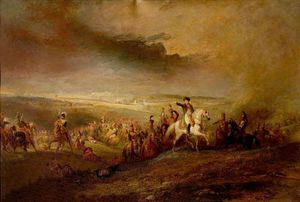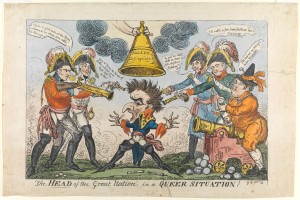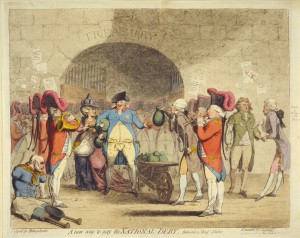This Thursday marks the 200th anniversary of the Battle of Waterloo, the decisive end of the sovereignty of Napoleon Bonaparte. I thought it would be interesting to examine the slang terms that arose from, or gave reference to, this famous battle.
Blücher (noun)
A non-privileged cab allowed in railway stations after the privileged cabs were all hired, late 19th century; named for the Prussian Field-Marshal Gebhard Leberecht von Blücher who arrived at Waterloo after the pitched battle and finished up whatever work remained (from A Dictionary of Slang and Colloquial English by John S. Farmer 1905).
Golden Cavalry of St. George
Monies paid to to continental heads of state by George III and the Prince Regent to bribe persuade them to stay with the allied cause against Napoleon; some historians think the gold was paid to keep other countries from joining Napoleon to fight the British (from Napoleonic Wars).
Meet One’s Waterloo
One who suffers a major (sometimes unexpected) defeat after having previously achieved victories. The phrase alludes to Napoleon’s defeat at Waterloo, Belgium, in 1815. By the mid-1800s, it was adapted to mean other kinds of defeat (from Dictionary.com).
Prussian (Prooshun) Blue
A great term of endearment. This was a pun on the color that capitalized on the huge popularity of the Prussians with British citizens after Waterloo (from A Dictionary of Slang and Colloquial English by John S. Farmer 1905 ). Toasts were often offered up to “The True Blue” and the “Prussian Blue.” Dickens included the endearment in his novel The Pickwick Papers in 1837 (Oxford Index).
Tommy
A British soldier; of disputed origin. Popular opinion holds the nickname was created by the Duke of Wellington after the Battle of Boxtel in 1794 (the Flanders campaign). After the fighting ended, the Duke saw wounded Private Thomas Atkins, who reportedly said, “It’s all right, sir. It’s all in a day’s work.” However, the Imperial War Museum documents Wellington using the the name “Tommy” much later, in an 1843 praise of soldiers. Consultation of the Oxford English Dictionary (OED), reveals yet another origin: the War Office chose the sobriquet in 1815, immediately following Waterloo, as documented in the Collection of Orders, Regulations, etc. published 31 August 1815. Further clouding the issue, several writers are credited with originating the nickname; the most famous is Rudyard Kipling’s stirring defense of soldiers and their treatment in “Tommy,” a poem included in his Barrack-Room Ballads in 1892. By WWI, the term was used universally, although rarely by British troops themselves, unless derisively (from Whizz Bangs and Windups: Ten Tommy Slang Terms).
Waterloo Day
Payday; after the Crimean War battles in 1854, also Balaclava Day (from A Dictionary of Slang and Colloquial English by John S. Farmer 1905).
Waterloo Stew
The unpalatable consequences of choices that turn out to be wrong; Napoleon was left suffering the consequences of his own actions after Waterloo (from The Ultimate Cockney Geezer’s Guide to Rhyming Slang).
Waterloo Porridge
A thin broth of gruel made with more water than oats. It is mentioned in the folk song, The Oldham Weaver (also known as The Hand-Loom Weaver and The Poor Cotton Weaver), which told the story of the son of a naive hero by the name of Jone o’Grinfilt Junior, and the hard times encountered by hand-loom weavers when steam-driven looms came into use and forced workers into mills. The song began circulating after 1815, and is still sung today under the name The Four-Loom Weaver. Whether Waterloo Porridge is a reference to food eaten by soldiers or merely anecdotal, the likeliest explanation is that the gruel is not named for the battle location but for the watery consistency of the porridge, as times were difficult with cotton famine and war-time trade embargoes (from The English Dialect Dictionary by Joseph Wright, 1905).











You must be logged in to post a comment.